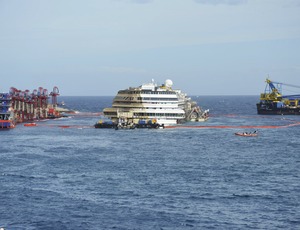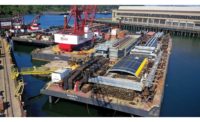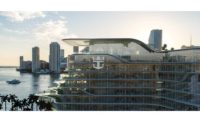
U.S. and Italian Specialists Team Up to Right Sunken Cruise Ship
With the parbuckling of the largest passenger ship ever conducted, U.S.-based Titan Salvage Co. and Italian underwater specialty contractor Micoperi in mid-September successfully righted the Costa Concordia cruise ship from its capsized position off the Italian island of Giglio, where it had run aground in 2012. According to the project's website, the contractors used a system of strand jacks and cables to rotate the stricken vessel an estimated 65° and place it onto a series of six undersea platforms, built upon 2-meter-dia pile foundations. After its righting, the 114,000-ton Costa Concordia was to be towed to port for scrapping, according to Titan.
SAIC Splits, Becomes Leidos
Science Applications International Corp., a McLean, Va.-based national-security and engineering firm, has voted to split into two companies, effective on Sept. 27. The national-security and health-care consulting division, which includes construction management and engineering, now will be known as Leidos. The technical-services and information-technology divisions will remain as SAIC Inc. This past spring, the company first announced its plans to split (ENR 4/29 p. 69). SAIC, now Leidos, ranks at No. 34 on ENR's list of the Top 500 Design Firms (ENR 4/29 p. 75).
Bridge To Replace Tunnel for Vancouver's River Crossing
In 2017, construction will start on a new bridge spanning the Fraser River, replacing the 72-ft-deep George Massey Tunnel, located 12 miles south of Vancouver, B.C. On Sept. 20, B.C. Premier Christy Clark announced that swapping the four-lane Highway 99 tunnel, which carries 80,000 daily vehicles, with a bridge offers the most reliable and safest way to add more lanes to the route connecting Vancouver with Interstate 5 in Washington. The tunnel, which opened in 1959, needs constant maintenance and leads to hours-long congestion. Engineering and technical work already has started.
Tampa Bay Water Loses Another Round in Reservoir Dispute
The U.S. Court of Appeals in Atlanta affirmed on Sept. 23 last year's trial court ruling in Tampa Bay Water v. HDR Engineering, which the regional water supplier had sought to appeal (ENR 4/23/12 p. 10). In April 2012, a federal jury decided the engineer was not responsible for extensive cracking at Tampa Bay Water's then-six-year-old, 15.5-billion-gallon reservoir. The utility, which had rejected a $30-million settlement offer in 2011, now faces HDR's legal fees, estimated at more than $20 million. To eliminate the reservoir's cracking, TBW initiated a $129-million rebuilding contract with Kiewit Infrastructure Group.





Post a comment to this article
Report Abusive Comment